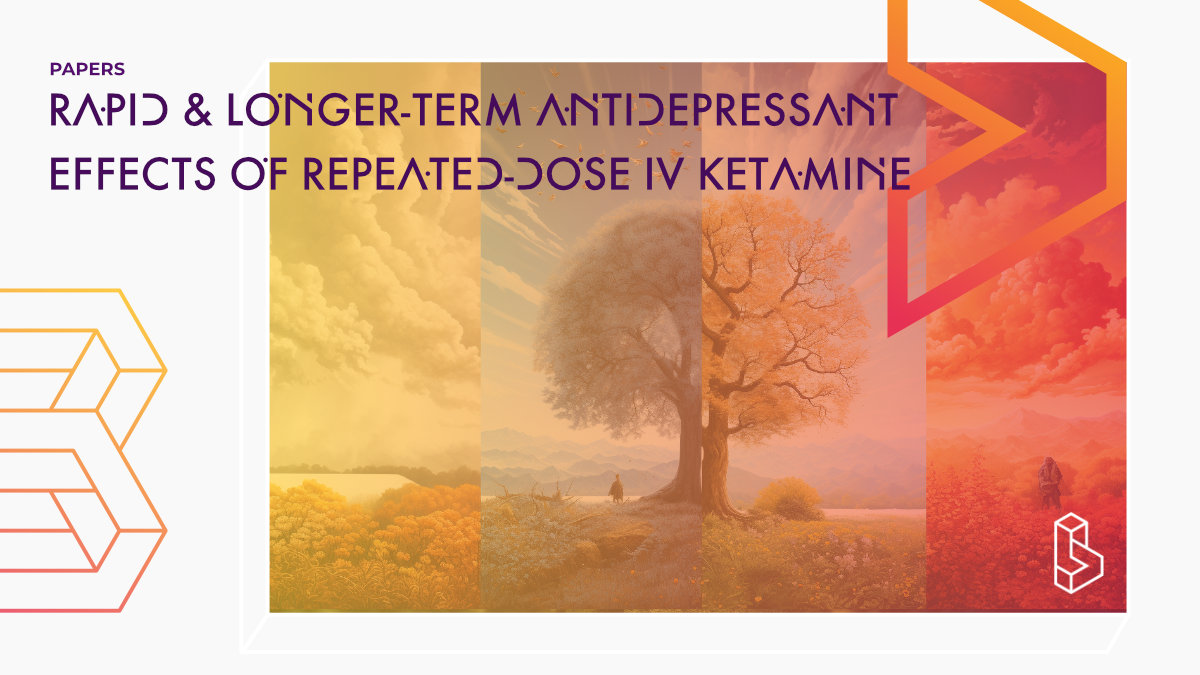This open-label study (n=97) on patients with unipolar and bipolar depression examined the effects of six repeated ketamine infusions. Significant and sustained improvements in depression and suicidal ideation were observed, with response and remission rates at 68.0% and 50.5%, respectively. The treatment was effective and safe, demonstrating rapid antidepressant and antisuicidal effects. Positive response factors included early response, higher income, and no prior psychiatric hospitalization.
Abstract of Rapid & longer-term antidepressant effects of repeated-dose IV ketamine
“Objective Single-dose intravenous (IV) injection of ketamine has shown rapid but transient antidepressant effects. The strategy of repeated-dose ketamine infusions to maintain antidepressant effects has received little systematic study. This study was conducted to examine the efficacy and tolerability of six ketamine infusions in Chinese patients with unipolar and bipolar depression.
Methods Ninety seven patients with unipolar (n = 77) and bipolar (n = 20) depression received repeated ketamine infusions (0.5 mg/kg over 40 min) with continuous vital sign monitoring. Depressive symptoms were measured by the Montgomery-Asberg Depression Rating Scale (MADRS). Suicidal ideation was assessed using the Scale for Suicidal Ideations (SSI)-part 1. Anxiety symptoms were evaluated with the 14-item Hamilton Anxiety Scale (HAMA). Adverse psychopathological and dissociative effects were assessed using the Brief Psychiatric Rating Scale (BPRS)-positive symptoms and Clinician Administered Dissociative States Scale (CADSS), respectively. Patients were assessed at baseline, 4 and 24 h, and 3, 4, 5, 6, 8, 9, 10, 11, 12, 13 and 26 days.
Results After six ketamine infusions, the response and remission rates were 68.0% and 50.5%, respectively. There were significant decreases in MADRS, SSI-part 1, and HAMA scores within four hours following the first ketamine infusion, and the decreases were sustained over the subsequent infusion period. The nonresponder subgroup manifested rapid significant improvement in suicidal ideations throughout the course of treatment. After the six ketamine infusions, the response was positively associated with the response at 24 h after the first infusion (OR = 8.94), personal income ≥4000 yuan/month (OR = 3.04), and no history of psychiatric hospitalization (OR = 3.41). Only CADSS scores had a mild but marginally significant increase after the first infusion but with a significant BPRS score decrease.
Conclusion Six ketamine infusions were safe and effective in patients with unipolar and bipolar depression. The rapid and robust antidepressant and antisuicidal effects of ketamine infusion within four hours were sustained following the subsequent infusions.“
Authors: Wei Zheng, Yan-Ling Zhou, Wei-Jian Liu, Cheng-Yu Wang, Yan-Ni Zhan, Han-Qiu Li, Li-Jian Chen, Ming Ding Li & Yu-Ping Ning
Summary of Rapid & longer-term antidepressant effects of repeated-dose IV ketamine
Mood disorders and suicidality are closely associated with personal suffering and public expenditure. Although effective pharmacological and psychosocial treatments exist, electroconvulsive therapy (ECT) has more rapid antidepressant and antisuicidal effects in patients with major depressive disorder and bipolar disorder.
Several augmentative strategies have been investigated to expedite antidepressant action, including ketamine, a high-affinity noncompetitive N-methyl-D-aspartic acid (NMDA) glutamate receptor antagonist, given in a single intravenous (IV) infusion at a subanesthetic dose (0.5 mg/kg). Ketamine has shown antidepressant efficacy within hours of administration.
Ketamine infusions repeated every 12 days seem to extend the antidepressant effect of ketamine, but mixed findings have been reported. For example, one study showed that six IV infusions of 0.5 mg/kg ketamine over 40 min were safe and efficacious for ten patients with treatment-resistant depression.
Find this paper
https://doi.org/10.1016/j.jpsychires.2018.09.013
Paywall | Google Scholar | Backup | 🕊
Cite this paper (APA)
Zheng, W., Zhou, Y. L., Liu, W. J., Wang, C. Y., Zhan, Y. N., Li, H. Q., ... & Ning, Y. P. (2018). Rapid and longer-term antidepressant effects of repeated-dose intravenous ketamine for patients with unipolar and bipolar depression. Journal of Psychiatric Research, 106, 61-68.
Study details
Compounds studied
Ketamine
Topics studied
Bipolar Disorder
Depression
Study characteristics
Open-Label
Participants
97
Humans
Compound Details
The psychedelics given at which dose and how many times
Ketamine 35 mg | 6xLinked Research Papers
Notable research papers that build on or are influenced by this paper
Pain mediates the improvement of social functions of repeated intravenous ketamine in patients with unipolar and bipolar depressionThis re-analysis of an open-label study (n=103) investigated the effects of ketamine (35mg/70kg, 6x) on pain, depression, and social function in patients with bipolar or unipolar depressive disorder. The results showed that ketamine treatment significantly improved psychosocial functioning and reduced pain index. Mediation analysis revealed that the severity of depressive symptoms and the affective index of pain partially mediated the association between ketamine treatment and improvements in subjective and objective social functioning.

